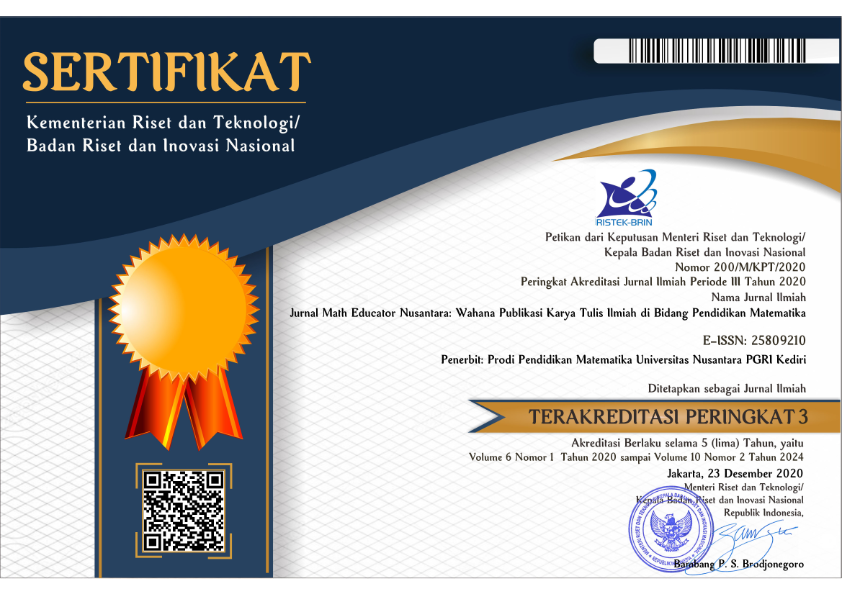Research on critical thinking of pre-service mathematics education teachers in Indonesia (2015-2023): A bibliometric review
DOI:
https://doi.org/10.29407/jmen.v9i1.19734Keywords:
critical thinking, bibliometric, pre-service teacherAbstract
Critical thinking involves being mentally organized and participating in a judgmental process to solve problems. The purpose of this study is to look at the focus of research related to critical thinking of pre-service teacher teachers of mathematics education, especially in Indonesia from 2015 to 2023. The method used in this study is a descriptive bibliometric analysis method. The Scopus database is used to obtain the necessary data. The results of the research show that publications related to the critical thinking of pre-service teacher teachers of mathematics education in Indonesia have increased from 2018 to 2020. Most of the publications were published in conference papers and some were in Q2 journals. The research focus is divided into 4 sections, namely, 1) mathematics teacher , mathematical problems , algebra , and qualitative research ; 2) critical thinking skills , mathematics education , and learning systems ; 3) problem based learning and STEM; 4) data analysis techniques, information analysis. The material that is the focus of research is algebra. New themes for this field are experimental research, digital platforms, quantitative methods, and group theory. The keywords of critical thinking skills are not directly connected with these new themes
References
Aini, N. R., Syafril, S., Netriwati, N., Pahrudin, A., Rahayu, T., & Puspasari, V. (2019). Problem-Based Learning for Critical Thinking Skills in Mathematics. 1st Young Scholar Symposium on Transdisciplinary in Education and Environment 2018, YSSTEE 2018, 1155(1). https://doi.org/10.1088/1742-6596/1155/1/012026
Andriani, D. G., & Jatmiko, J. (2018). Kemampuan Berpikir Kritis Siswa melalui Model Pembelajaran Learning Cycle. Jurnal Math Educator Nusantara: Wahana Publikasi Karya Tulis Ilmiah Di Bidang Pendidikan Matematika, 4(2), 125-131. https://doi.org/10.29407/jmen.v4i2.12329
Aminudin, M., & Basir, M. A. (2019). Kemampuan Berpikir Kritis Mahasiswa Calon Guru Matematika dalam Menilai Kebenaran Pernyataan Matematis. UNION: Jurnal Ilmiah Pendidikan Matematika, 7(3), 369–382. https://doi.org/10.30738/union.v7i3.5841
Cahyono, B., Kartono, Waluyo, B., & Mulyono. (2019). Analysis critical thinking skills in solving problems algebra in terms of cognitive style and gender. 5th International Conference on Mathematics, Science and Education 2018, ICMSE 2018, 1321(2). https://doi.org/10.1088/1742-6596/1321/2/022115
Firdaus, M., & Azis, Z. (2020). Supporting Critical Thinking Skills In Blended Learning Environment…. 4(2), 63–71.
Firdaus, M., & Mukhtar. (2020). Critical Thinking Skills of Mathematics Prospective Teachers: An Exploration Study at Medan State University. Journal of Physics: Conference Series, 1462(1), 12005. https://doi.org/10.1088/1742-6596/1462/1/012005
Fitriati, F., & Prayudi, S. (2021). 21st Century Teaching and Learning: Student Teacher’s Perceptions and Challenges in Higher Education Institutions. Al Khawarizmi: Jurnal Pendidikan Dan Pembelajaran Matematika, 5(1), 12. https://doi.org/10.22373/jppm.v5i1.9342
Hadi, F. R. (2021). Efektifitas Model Pbl Terintegrasi STEM Terhadap Kemampuan Berpikir Kritis Matematis Siswa Kelas V SD. Jurnal Pendidikan Tambusai, 5(3), 6644–6649. https://doi.org/10.31004/jptam.v5i3.2005
Handayani, E. S., Yuberti, Saregar, A., & Wildaniati, Y. (2021). Development of STEM-integrated physics e-module to train critical thinking skills: The perspective of preservice teachers. IOP Conference Series: Earth and Environmental Science, 1796(1). https://doi.org/10.1088/1742-6596/1796/1/012100
Hidayat, M. R., Irvansyah, M., & Melati, S. A. (2022). KESIAPAN PERGURUAN TINGGI DALAM MENDIDIK CALON GURU MATEMATIKA UNTUK MENGAJAR DI ERA SOCIETY 5 . 0. 4(Sandika IV).
Junianto, & Wijaya, A. (2019). Developing Students’ Mathematical Literacy through Problem Based Learning. In A. A.M., W. A., & V. J.A. (Eds.), 2nd International Seminar on Innovation in Mathematics and Mathemathics Education, ISIMMED 2018 (Vol. 1320, Issue 1). Institute of Physics Publishing. https://doi.org/10.1088/1742-6596/1320/1/012035
Koculu, A., Topcu, M. S., & Ciftci, A. (2022). The Effect of STEM Education on Pre-Service Science Teachers’ Perceptions of 21st Century Skills and Competences and Problem Solving Skills. Open Journal for Educational Research, 6(2), 165–172. https://doi.org/10.32591/coas.ojer.0602.05165k
Kurniati, D., Purwanto, As’ari, A. R., Dwiyana, Subanji, & Susanto, H. (2019). Development and validity of problems with contradictory information and no specified universal set to measure the truth-seeking of pre-service mathematics teachers. TEM Journal, 8(2), 545–553. https://doi.org/10.18421/TEM82-30
Kusaeri, & Aditomo, A. (2019). Pedagogical beliefs about Critical Thinking among Indonesian mathematics pre-service teachers. International Journal of Instruction, 12(1), 573–590. https://doi.org/10.29333/iji.2019.12137a
Kusharyadi, R.; Pertiwi, S.; Yohanna, E. S. S.; Dasari, D. (2023). Bibliometric Analysis : Sofware Usage Trends GeoGebra in Mathematics Learning From 2017 - 2022. 11(1), 196–205.
Marasabessy, R., Hasanah, A., & Angkotasan, N. (2021). Efforts to improve students’ mathematical critical thinking ability by using Team Assisted Individualization learning model. Journal of Physics: Conference Series, 1882(1), 12051. https://doi.org/10.1088/1742-6596/1882/1/012051
Marchy, F., Murni, A., Kartini, & Muhammad, I. (2022). The Effectiveness of Using Problem Based Learning (PBL) in Mathematics Problem Solving Ability for Junior High School Students. AlphaMath Journal of Mathematics Education, 8(2), 185–198. https://doi.org/10.30595/alphamath.v8i2.15047
Mayani, I., Suripah, & Muhammad, I. (2022). Analysis of Students’ Errors in Solving Statistical Problems: A Case of 8th Grade Students at SMPN 4 Siak Hulu, Indonesia. Jurnal Pendidikan Mipa, 23(4), 1826–1838. https://doi.org/10.23960/jpmipa/v23i2.pp1827-1838
Mellawaty, & Taufan, M. (2021). LMS-Google Classroom Digital Platform: Impact on the Critical Thinking Ability, Self-Concept, and Mathematics Anxiety of Pre-Service Mathematics Teachers during the Covid-19 Pandemic in Indramayu, Indonesia. Journal of Physics: Conference Series, 1783(1). https://doi.org/10.1088/1742-6596/1783/1/012126
Moher, D., Liberati, A., Tetzlaff, J., & Douglas. (2009). Preferred eeporting items for systematic reviews and meta-analyzes: The PRISMA statement. Journal of Chinese Integrative Medicine, 7(9), 889–896. https://doi.org/https://doi.org/10.1136/bmj.b2535
Muhammad, I., Elmawati, Samosir, C. M., & Marchy, F. (2023). Bibliometric Analysis: Research on Articulate Storylines in Mathematics Learning. EduMa: Mathematics Education Learning And Teaching, 12(1), 77–87. https://doi.org/10.24235/eduma.v12i1.12607
Muhammad, I., Himmawan, D. F., Mardliyah, S., & Dasari, D. (2023). Analisis Bibliometrik: Fokus Penelitian Critical Thinking dalam Pembelajaran Matematika (2017–2022). JPMI (Jurnal Pembelajaran Matematika Inovatif), 6(1), 78–84. https://doi.org/10.22460/jpmi.v6i1.14759
Muhammad, I., Marchy, F., Do, A., & Naser, M. (2023). Analisis Bibliometrik : Tren Penelitian Etnomatematika dalam Pembelajaran Matematika Di Indonesia ( 2017 – 2022 ). JIPM (Jurnal Ilmiah Pendidikan Matematika), 11(2), 267–279. https://doi.org/10.25273/jipm.v11i2.14085
Muhammad, I., Marchy, F., Rusyid, H. K., & Dasari, D. (2022). Analisis Bibliometrik : Penelitian Augmented Reality Dalam Pendidikan Matematika. JIPM (Jurnal Ilmiah Pendidikan Matematika), 11(1), 141–155. https://doi.org/10.25273/jipm.v11i1.13818
Muhammad, I., Mukhibin, A., Naser, A. do muhammad, & Dasari, D. (2022). Bibliometric Analysis: Research Trend of Interactive Learning Media in Mathematics Learning in Indonesia. Prisma Sains: Jurnal Pengkajian Ilmu Dan Pembelajaran Matematika Dan IPA IKIP Mataram, 11(1), 10–22. https://doi.org/10.26737/jpmi.v8i1.4005
Muhammad, I., Samosir, C. M., Elmawati, & Marchy, F. (2023). Bibliometric Analysis : Adobe Flash Cs6 Research in Mathematics Learning. Jurnal Pendidikan Matematika Indonesia, 8(1), 25–34. https://doi.org/10.26737/jpmi.v8i1.4005
Muhammad, I., & Yolanda, F. (2022). Minat Belajar Siswa Terhadap Penggunaan Software Adobe Flash Cs6 Profesional Sebagai Media Pembelajaran. JIPM (Jurnal Ilmiah Pendidikan Matematika), 11(1), 1–12. https://doi.org/10.25273/jipm.v11i1.11083
Munawwarah, M., Laili, N., & Tohir, M. (2020). KETERAMPILAN BERPIKIR KRITIS MAHASISWA DALAM MEMECAHKAN MASALAH MATEMATIKA BERDASARKAN KETERAMPILAN ABAD 21. Alifmatika: Jurnal Pendidikan Dan Pembelajaran Matematika, 2(1), 37–58. https://doi.org/10.35316/alifmatika.2020.v2i1.37-58
Phoong, S. Y., Khek, S. L., & Phoong, S. W. (2022). The Bibliometric Analysis on Finite Mixture Model. SAGE Open, 12(2), 1–13.
Rahaju, E. B., Fardah, D. K., Wijayanti, P., & Ismail. (2020). Kemampuan Guru-guru Matematika SMP Kabupaten Ponorogo dalam mengembangkan soal Berpikir Tingkat Tinggi. Jurnal Pendidikan Matematika Raflesia, 05(01), 75–81.
Rahmawati, L., & Juandi, D. (2022). Pembelajaran Matematika Dengan Pendekatan Stem: Systematic Literature Review. Teorema: Teori Dan Riset Matematika, 7(1), 149. https://doi.org/10.25157/teorema.v7i1.6914
Rasiman. (2015). Leveling of critical thinking abilities of students of mathematics education in mathematical problem solving. Journal on Mathematics Education, 6(1), 40–52. https://doi.org/10.22342/jme.6.1.1941.40-52
Suharno. (2020). Penggunaan Model Pembelajaran Flipped Classroom untuk Pembelajaran Daring Sosiologi di Masa Pandemi Covid-19 Kelas XII. IPS SMA Negeri 1 Juwana Kab. Pati tahun 2020. 4(2).
Susilo, B. E., Darhim, D., & Prabawanto, S. (2020). Critical thinking skills in integral calculus lecture based on mathematical dispositions. International Conference on Mathematics and Science Education 2019, ICMScE 2019, 1521(3). https://doi.org/10.1088/1742-6596/1521/3/032045
Susilo, B. E., Darhim, & Prabawanto, S. (2019). Students’ critical thinking skills toward the relationship of limits, continuity, and derivatives of functions. International Journal of Scientific and Technology Research, 8(10), 2299–2302. https://www.scopus.com/inward/record.uri?eid=2-s2.0-85074605232&partnerID=40&md5=e69e47248d0d1e0c094e36e0540358aa
Yuningsih, N., Nursuprianah, I., & Manfaat, B. (2021). Eksplorasi Etnomatematika pada Rancang Bangun Rumah Adat Lengkong. Jurnal Riset Pendidikan Matematika Jakarta, 3(1), 1–13. https://doi.org/10.21009/jrpmj.v3i1.19517
Downloads
Published
Issue
Section
License
Authors who publish with this journal agree to the following terms:
- Copyright on any article is retained by the author(s).
- The author grants the journal, the right of first publication with the work simultaneously licensed under a Creative Commons Attribution License that allows others to share the work with an acknowledgment of the work’s authorship and initial publication in this journal.
- Authors are able to enter into separate, additional contractual arrangements for the non-exclusive distribution of the journal’s published version of the work (e.g., post it to an institutional repository or publish it in a book), with an acknowledgment of its initial publication in this journal.
- Authors are permitted and encouraged to post their work online (e.g., in institutional repositories or on their website) prior to and during the submission process, as it can lead to productive exchanges, as well as earlier and greater citation of published work.
- The article and any associated published material is distributed under the Creative Commons Attribution-ShareAlike 4.0 International License













